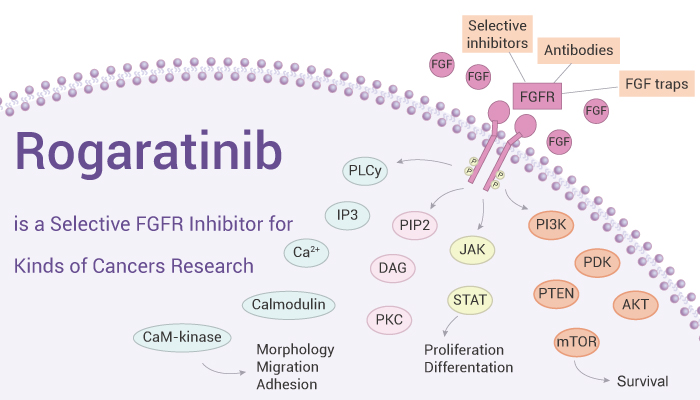FGFR (Fibroblast growth factor receptors), a family of receptor tyrosine kinases, are the receptors that bind to members of the fibroblast growth factor family of proteins. FGFRs play crucial roles in both developmental and adult cells. Five distinct membrane FGFR exist in vertebrates and all of them belong to the tyrosine kinase superfamily (FGFR1, FGFR2, FGFR3, FGFR4, FGFR6). Some of these receptors play an important role in pathological conditions.
The fibroblast growth factor family constitutes one of the most important groups of paracrine factors that act during development. They are responsible for determining certain cells to become mesoderm, for the production of blood vessels, for limb outgrowth, and for the growth and differentiation of numerous cell types. Growing evidences suggest that the fibroblast growth factor/FGF receptor (FGF/FGFR) signaling has crucial roles in a multitude of processes during embryonic development and adult homeostasis by regulating cellular lineage commitment, differentiation, proliferation, and apoptosis of various types of cells. Therefore, the malfunction of FGF/FGFR signaling axis exists in a variety of human diseases, such as congenital craniosynostosis and dwarfism syndromes, as well as chronic kidney disease (CKD), obesity, insulin resistance, and various tumors.

Rogaratinib (BAY1163877) is a potent and selective pan‐FGFR inhibitor.
Aberrant activation in fibroblast growth factor signaling plays an important role in the development of various cancers, including squamous cell lung cancer, squamous cell head and neck carcinoma, colorectal and bladder cancer. Rogaratinib is a potent and selective pan‐FGFR inhibitor with broad antitumor activity in FGFR‐overexpressing preclinical cancer models. In vitro kinase activity assays demonstrate that Rogaratinib potently and selectively inhibits the activity of FGFRs 1, 2, 3 and 4. What’s more, Rogaratinib reduced proliferation in FGFR‐addicted cancer cell lines of various cancer types including lung, breast, colon and bladder cancer. Meanwhile, FGFR and ERK phosphorylation interruption by Rogaratinib treatment in several FGFR‐amplified cell lines suggests that the anti‐proliferative effects are mediated by FGFR/ERK pathway inhibition. Furthermore, Rogaratinib exhibited strong in vivo efficacy in several cell line‐ and patient‐derived xenograft models characterized by FGFR overexpression.
All in all, Rogaratinib is a potent and selective FGFR inhibitor that exhibits anti-tumor activity.
References:
[1] Dai S, et, al. Cells. 2019 Jun 18;8(6):614.
[2] Grünewald S, et, al. Int J Cancer. 2019 Sep 1;145(5):1346-1357.